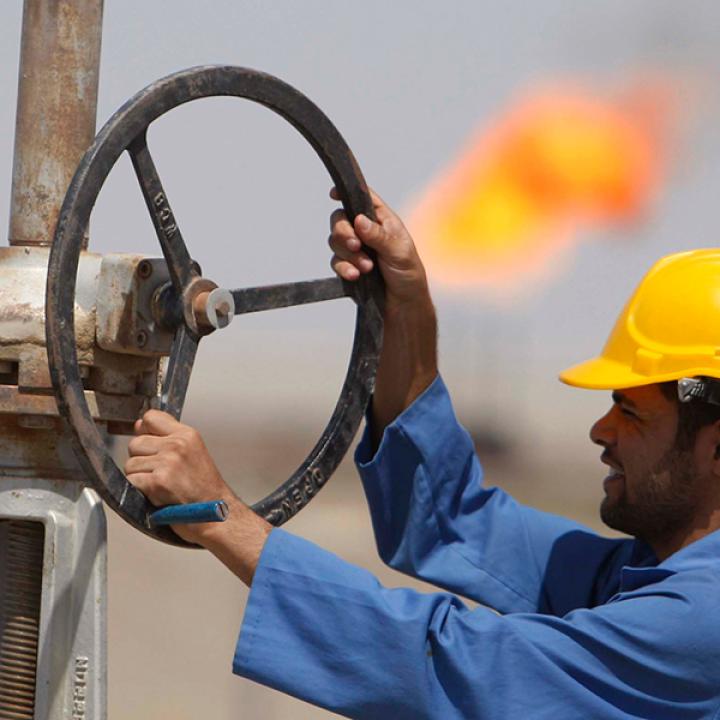
- Policy Analysis
- Policy Alert
Israel May Lose Oil Access in Baghdad-Kurdish Deal

Years of quiet and fairly lucrative oil trading between the Kurds and Israel are now being threatened by messy legal disputes involving Baghdad and Turkey.
Over the past decade, one of Israel’s main sources of crude oil has been Iraq. Despite the lack of diplomatic recognition from Baghdad and years of tension with Ankara, Israel has been a top buyer for oil supplies that the Kurdistan Region of Iraq pumps across southern Turkey to the Mediterranean port of Ceyhan. In turn, producing and selling this oil has helped the KRI maintain partial autonomy from the Iraqi federal government.
Last month, however, Baghdad’s long-simmering energy disputes with the KRI came to head when an international court arbitrating between Iraq and Turkey found in the former’s favor. The case in question centered on Baghdad’s claim—now validated—that Ankara had violated a bilateral agreement by allowing Kurdish oil to flow to Ceyhan.
Israel’s oil trade with the KRI has been successful in large part because of favorable pricing. The Kurds have sold their oil at a discount compared to the prevailing prices for other Iraqi oil, enabling the traders involved to maintain rewarding margins. In the past, these supplies met a significant part of Israel’s domestic energy needs, but this situation changed once the country began developing its offshore natural gas reserves, which it uses for both electricity generation and export to Egypt and Jordan.
As a result, Israel has been re-exporting some of the KRI crude abroad. After being shipped from Ceyhan, some of the supplies are processed at refineries in Haifa and Ashdod, while others are offloaded south of Ashkelon on the Mediterranean and pumped via pipeline across the country to the Red Sea port of Eilat. From there, they are shipped to customers in Asia, including refiners in China and Taiwan. (This pipeline dates from before Iran’s 1979 revolution, when the shah supplied oil to Israel; its flow has since been reversed and is now operated by the Europe Asia Pipeline Company, or EAPC.)
Although Israeli reporting restrictions prevent a definitive tally of these transactions and pipeline operations, the energy newsletter MEES estimated in January that Israeli imports of Kurdish crude had reached a record 194,000 barrels per day, based on information from the data intelligence firm Kpler. The same month, crude exports from Eilat reportedly totaled 195,000 b/d. These high figures may be an anomaly, as other reports suggest that the average for 2022 was 70,000 b/d. Yet even the lower figure represents about 16 percent of total Kurdish exports.
The arbitration ruling could impair this trade in multiple ways. Most immediately, KRI oil flows to Turkey have yet to resume. On April 11, Baghdad petitioned the U.S. federal court in Washington to enforce the arbitration award against Turkey, which stands at $1.5 billion with interest. Yet Ankara is said to regard this financial obligation as the KRI’s.
Moreover, the Kurds have reached a tentative deal that would allow their oil to be marketed by the State Oil Marketing Organization of Iraq (SOMO). On April 7, MEES described Israel as “one sure loser” if SOMO is able to secure long-term control over Iraq’s oil exports, since Baghdad regards trade with Israel as illegal—a longstanding position bolstered by a new anti-normalization law passed a year ago.
Given its market access to alternative crude supplies, Israel will not face an energy crisis due to the ruling—in addition to the KRI, it reportedly imports oil from Azerbaijan and Russia to meet its current domestic demand of around 210,000 b/d. Yet the hiatus and potential marketing changes may mark the end of a trade relationship that has underpinned a quiet but important link between Iraqi Kurds and Israel.
Simon Henderson is the Baker Fellow and director of the Bernstein Program on Gulf and Energy Policy at The Washington Institute. Bilal Wahab is the Institute’s Wagner Fellow and founder of the Center for Development and Natural Resources at the American University of Iraq-Sulaimani. Henry Rome is a senior fellow at the Institute.



